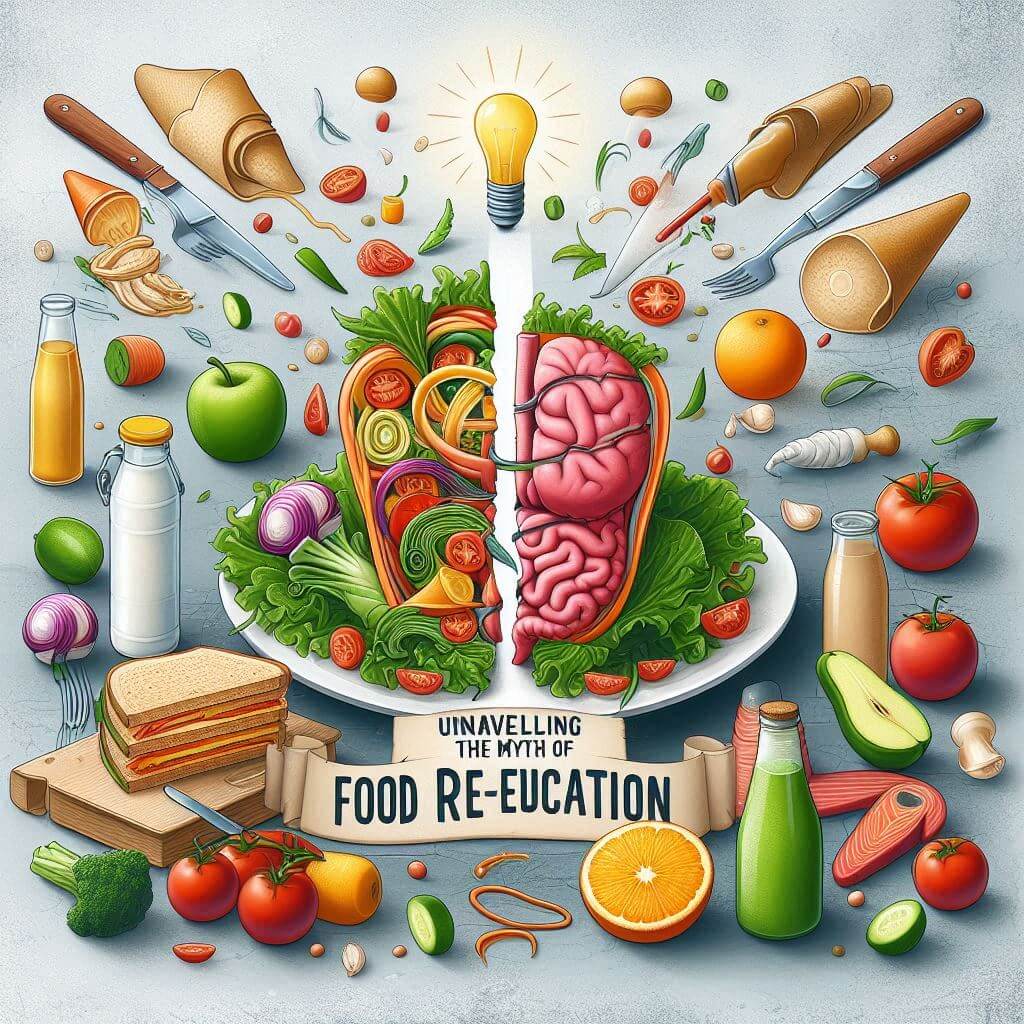THE nutritional reeducation It is a journey of transformation that goes beyond simply exchanging food.
It is a process of reconnecting with the body, of recovering the pleasure of food and of building a healthy and sustainable relationship with food.
Unfortunately, many misconceptions surround this concept, making it difficult to understand and adopt.
Let's demystify these misconceptions and build a solid foundation for conscious, pleasurable and sustainable eating.
Myth 1: Reeducation of eating habits is a restrictive diet
Unlike fad diets, characterized by severe restrictions, promises of quick results and, often, a conflicting relationship with food, nutritional re-education is an inclusive and enjoyable approach.
It's not about eliminating food groups or going hungry, but about making conscious and balanced choices.
- Food reeducation is a celebration of food diversity. Instead of depriving yourself of foods you enjoy, the idea is to find more nutritious and tasty alternatives. For example, if you’re a chocolate lover, try high-cacao versions, which are rich in antioxidants. Or, if you love pasta, opt for whole-grain versions, which provide fiber and other nutrients. The key is to find substitutes that satisfy your taste buds and contribute to a more balanced diet.
- Food is a sensory experience. Discovering new flavors, textures and aromas is an integral part of nutritional reeducation. Try different cuisines, incorporate unusual ingredients and have fun in the kitchen. Cooking is a form of creative expression and can be a pleasurable and enriching activity.

Myth 2: Re-educating your eating habits is complicated and time-consuming
Re-educating your eating habits is based on simple principles and can be easily incorporated into your daily routine. You don’t need to become a professional chef or nutritionist to get started. The secret is to listen to your body, prioritize natural foods, and find pleasure in food.
- Planning is essential, but it doesn’t have to be complex. Take a few minutes at the beginning of the week to think about healthy, practical meal options. This will help you avoid making impulsive, unhealthy choices. Cooking at home is also a great way to control your ingredients and create delicious, personalized meals. Use your time in the kitchen as a time for relaxation and creativity.
- THE mindfulness practice is a powerful ally in nutritional reeducation. By paying attention to your hunger and fullness cues, chewing slowly, and savoring each bite, you establish a deeper connection with your food. This helps improve digestion, prevents overeating, and increases the pleasure of eating. Try eating in a quiet environment, free from distractions, to enhance this experience.
- IMindfulness-based intervention to promote healthy eating habits: a systematic review and meta-analysis.”
Myth 3: Dietary Reeducation is Exclusively for Weight Loss

Nutritional reeducation is a powerful tool to improve the overall quality of life. Although the weight loss may be a side benefit, the gains in health, well-being and quality of life are much broader.
- One balanced diet is the basis for good physical and mental health. Proper nutrition provides essential nutrients for the proper functioning of the body, including energy, disposition, concentration, mood and the immune system. In addition, a diet rich in fruits, vegetables, greens and whole grains helps prevent chronic diseases such as diabetes, heart disease and some types of cancer. SEE NUTRITIOUS RECIPES
- Re-educating your diet can improve sleep quality, increase energy and reduce stress. Some nutrients, such as tryptophan found in foods like bananas, chia seeds and oats, are linked to the production of serotonin, a neurotransmitter that promotes relaxation and sleep. In addition, a regular diet helps to stabilize blood sugar levels, preventing energy fluctuations and irritability.
Myth 4: Dietary Reeducation Requires Elimination of Food Groups
All food groups have their place in a healthy diet. The key is to choose the most nutritious sources and eat in moderation.
- Variety is essential for a balanced diet. Incorporate different types of foods into your meals, such as complex carbohydrates (whole grains, vegetables), proteins lean (poultry, fish, legumes), healthy fats (olive oil, avocado, nuts), fruits and vegetables. This diversity ensures the supply of different essential nutrients for the body.
- The quality of food is more important than the quantity. Prioritize natural or minimally processed foods, such as fruits, vegetables, greens, whole grains, lean meats, eggs, fermented dairy products and nuts. These foods are rich in nutrients and contribute to a healthy and sustainable diet.
Myth 5: Re-education of eating habits doesn’t work

Dietary re-education is a proven and effective approach, supported by numerous scientific studies. However, it is important to emphasize that results do not appear overnight.
- Consistency is the key to success. Small daily changes, added together over time, generate significant results. Be patient and persistent, even when faced with challenges. Celebrate small victories and learn from possible mistakes.
- Seek support and motivation. Sharing experiences with others who are going through the same process can be very enriching. Look for support groups, join online communities or find a health professional who can accompany you on this journey.
- “Long-term effect of dietary reeducation on weight control and quality of life: a 5-year follow-up study.”
Food reeducation is a continuous process of learning and adaptation. Be open to new information, try different approaches, and find what works best for you.
The important thing is to build a healthy and pleasurable relationship with food, which promotes your physical and emotional well-being. check out these wonderful recipes
Here is a FAQ table to help clarify common doubts about nutritional reeducation:
| Question | Response |
|---|---|
| 1. What is nutritional reeducation? | Food re-education is a transformation process that aims to develop a healthy and balanced relationship with food, promoting conscious and pleasurable food choices. |
| 2. How does nutritional reeducation differ from a diet? | Unlike restrictive diets that may eliminate food groups or promise quick results, nutritional re-education focuses on balanced choices and the inclusion of a variety of nutritious foods. |
| 3. Is nutritional re-education difficult to follow? | Changing your eating habits doesn’t have to be complicated. It involves simple changes in habits, such as listening to your body and planning healthy meals that can be adapted to your daily routine. |
| 4. Is it necessary to eliminate certain foods for nutritional reeducation? | There is no need to eliminate foods, but rather to find balance and moderation. The key is to make more nutritious choices and incorporate variety into your diet. |
| 5. Can dietary re-education help with weight loss? | Yes, nutritional re-education can help with weight loss, but its main focus is to promote a balanced diet to improve overall health and well-being. |
| 6. How can meal planning facilitate nutritional reeducation? | Meal planning helps you avoid impulsive choices and ensures you have healthy options available. Taking the time to plan and prepare meals can make changing your eating habits easier and more sustainable. |
| 7. How does mindfulness relate to nutritional reeducation? | Practicing mindfulness, such as eating slowly and paying attention to hunger and fullness cues, can help you establish a deeper connection with food and improve digestion and food satisfaction. |
| 8. What are the health benefits of nutritional reeducation? | In addition to promoting a balanced diet, nutritional re-education can improve mental health, increase energy, improve sleep and reduce the risk of chronic diseases, such as diabetes and heart disease. |
| 9. Is it necessary to seek professional help to start nutritional reeducation? | While not required, seeking guidance from a nutritionist or healthcare professional can provide additional support, help create a personalized plan, and answer specific questions. |
| 10. What are some examples of simple changes in dietary reeducation? | Swapping refined foods for whole foods, adding more fruits and vegetables to your diet, choosing lean protein options, and using natural seasonings instead of salt are examples of changes that can be easily incorporated. |









